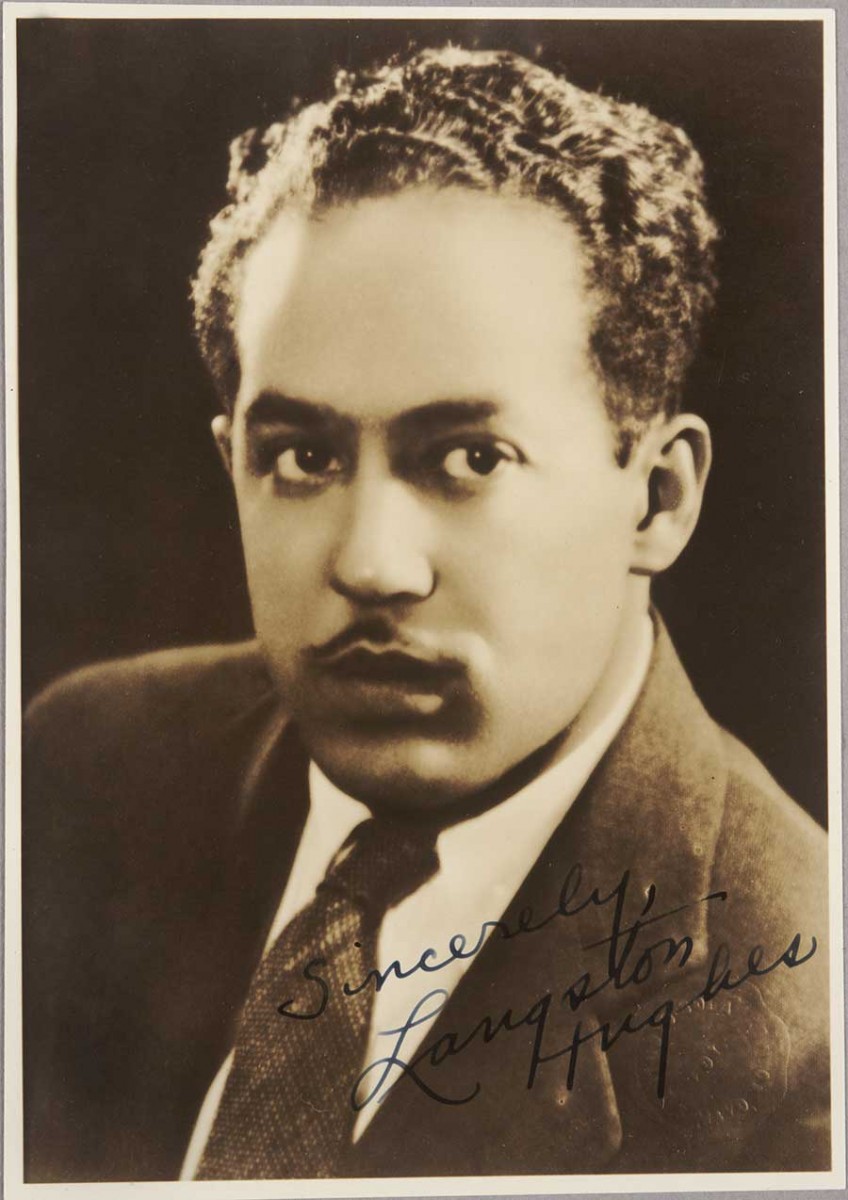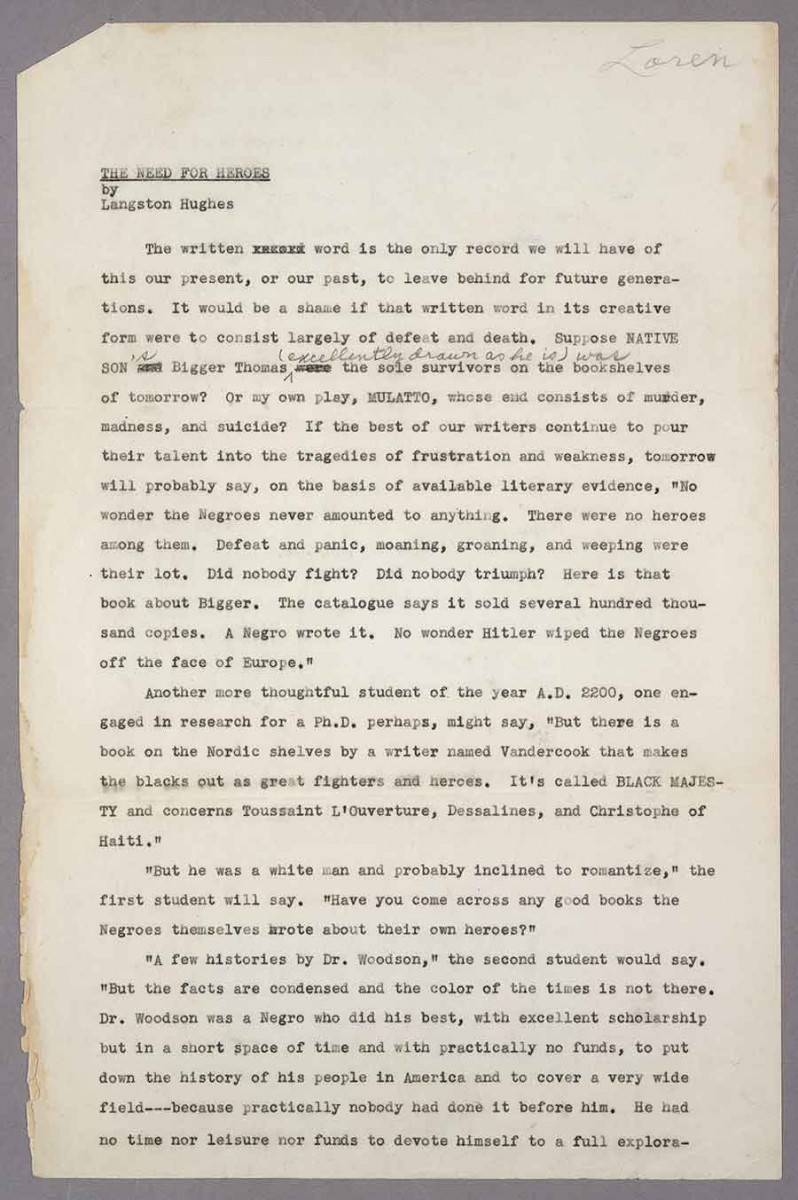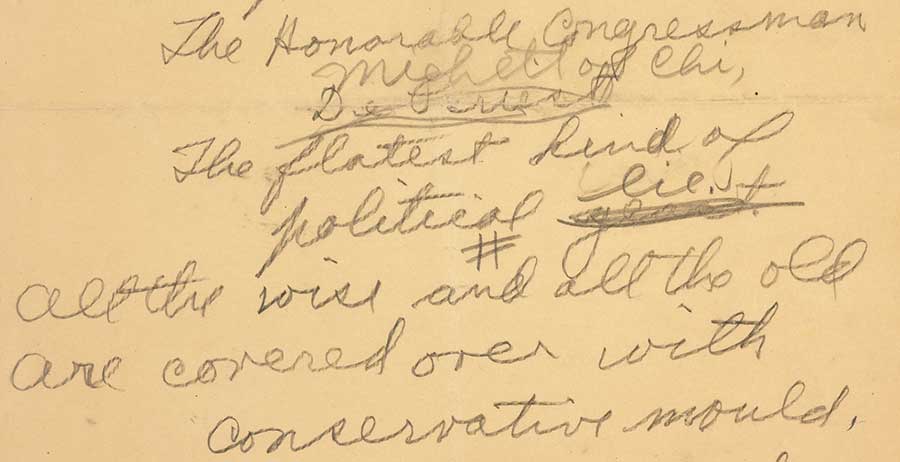The Huntington’s blog takes you behind the scenes for a scholarly view of the collections.
Finding Clues Left by Langston Hughes
Posted on Thu., April 22, 2021 by

Portrait of Langston Hughes, signed by the author. The Huntington Library, Art Museum, and Botanical Gardens.
Archives are full of mysteries. Many manuscripts are undated. Often letters are addressed to first names and signed with initials. Accurately identifying and describing an item can be a research project all on its own.
One such curious document arrived in 2002, when The Huntington acquired a small collection of materials by Langston Hughes from the family of Hughes' friend, Loren Miller. Among the correspondence, manuscripts, and ephemera was a handwritten draft of a poem by Hughes titled “Wise Men” and attributed to “Kid Turner.” It is not dated. The poem presents several small mysteries. When was is written? Why did Hughes use a pseudonym? What, if anything, can the manuscript tell us about these questions?
The Huntington first acquired materials by Hughes in 1941. At the time, the Library was actively developing a collection called the California Poetry File and sent Hughes a request asking for a contribution. Hughes graciously complied, sending a few poems, an autobiographical sketch, and a signed portrait.
Born in Joplin, Missouri, at the turn of the 20th century, Langston Hughes was a key figure in the Harlem Renaissance. Centered around Harlem, New York, in the 1920s and early 1930s, the flourishing of creative arts known as the Harlem Renaissance brought the artistic output of African Americans to international attention. Hughes published his first book of poetry in 1926. He spent time in the artists' haven in Carmel, California, in the 1930s, and was awarded a Guggenheim fellowship in 1935.
Hughes was inspired by the music of the Black community, especially the blues. As he wrote in “Songs Called the Blues” (1941), the blues were songs that came out of “black, beaten, but unbeatable throats.” He tapped into the experiences of common people, the pain and hope of the underprivileged, as well as their fortitude and wisdom. The poem “Dream Dust” captures this tenacious hope and the determination to create something better.

Corrected draft of “The Need for Heroes,” an essay by Langston Hughes. The Huntington Library, Art Museum, and Botanical Gardens.
Though best known as a poet, Hughes also wrote essays, plays, and novels, and even a children’s book. Like Miller, he was a social activist, engaged in politics. Hughes lived in an era of segregation and vocal racism, and he addressed these problems in his works. Miller, an attorney, fought racism on the legal front, successfully arguing against restrictive covenants on home buying to the Supreme Court. In 2006, The Huntington acquired the papers of Loren Miller, including additional materials by Hughes.
Among the items in the 2002 acquisition is an example of Hughes’ activist prose: a corrected, typewritten draft of an essay called “The Need for Heroes.” Published in 1941 in The Crisis, the journal of the National Association for the Advancement of Colored People, the essay calls on African American writers to use their talent to tell the stories of Black heroes. Hughes argues that there need to be stories of triumph and accomplishment worthy of emulation, not just “tragedies of frustration and weakness.”
Like “The Need for Heroes,” the poem “Wise Men” is a call to action, this one directed at African American youth. The handwriting is large, loopy, and messy. It is written on a standard sheet of letter-sized paper. Hughes had plenty of space for more text. Was he in a hurry? Is the handwriting a reflection of Hughes’s emotion, captured on the page? Comparison to other autograph drafts might answer such questions.
Searching for a published version of the poem is the first step when looking for answers. There is a poem by Hughes titled “Wise Men” published in 1927, but the text of the poem is completely different. The 1927 poem begins “Let me become dead eyed / Like a fish . . .” The undated draft at The Huntington begins “How strange how awful The wise can be.” The alternate poem raises new questions. Which came first? Did Hughes reuse other titles, or is this item unique? Careful examination of the corrected draft of The Huntington’s “Wise Men” can help us answer at least one question—the initial question of its date.
A notable change in the hand-corrected text is the substitution of the phrase "Michell [sic] of Chi" for the name “DePriest." Oscar DePriest was the first Black person elected to the U.S. House of Representatives in the 20th century. He represented the 1st congressional district of Illinois, including the South Side of Chicago. On Nov. 6, 1934, Arthur Mitchell, a Democrat, defeated DePriest, a Republican, to become the second Black person and first Black person as a Democrat to be elected to the U.S. House of Representatives. (Incidentally, this seat has been held by an African American ever since.)

Detail of “Wise Men,” an unpublished poem by Langston Hughes, highlighting the substitution of “Michell of Chi” for “DePriest” and the alteration of their corresponding rhymes.
This telling change supports an argument dating the poem to late 1934, when the election of Mitchell would have caused Hughes to alter his rhyme of Priest/yeast to Chi/lie. It marks the poem as having been composed later than the published “Wise Men.” There is still no indication why Hughes chose to reuse the title or employ a pseudonym. Perhaps future researchers will resolve those questions.
Archives may be full of mysteries, but they can also yield answers. And sometimes those answers are right in front of you.
Natalie Russell is the assistant curator of literary collections at The Huntington.